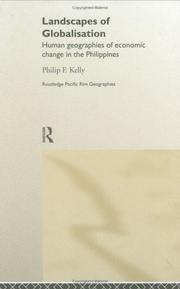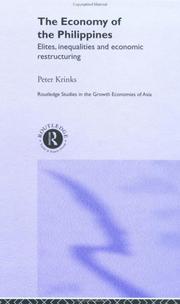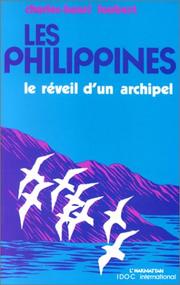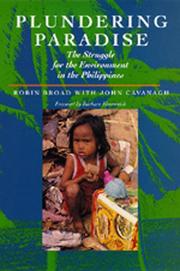| Listing 1 - 10 of 14 | << page >> |
Sort by
|
Book
ISBN: 0713517069 9780713517064 Year: 1973 Publisher: London Bell
Abstract | Keywords | Export | Availability | Bookmark
 Loading...
Loading...Choose an application
- Reference Manager
- EndNote
- RefWorks (Direct export to RefWorks)
Philippines --- Economic conditions --- Social conditions --- Economic conditions. --- Social conditions. --- Philippines - Economic conditions --- Philippines - Social conditions

ISBN: 113465328X 1280336870 020302169X 0203170881 0415191599 0415757630 9780203170885 9780203021699 9780415191593 0203173031 9780203173039 9786610336876 6610336873 9781134653287 9781134653232 1134653239 9781134653270 1134653271 9780415757638 Year: 2000 Publisher: London New York Routledge
Abstract | Keywords | Export | Availability | Bookmark
 Loading...
Loading...Choose an application
- Reference Manager
- EndNote
- RefWorks (Direct export to RefWorks)
In this critical and sophisticated analysis, Philip F. Kelly challenges the conventional definition of globalization as an irresistible and inevitable force to which societies must succumb. By tracing the consequences of global economic integration in the Philippines, he argues that global processes are constituted, accommodated, mediated and resisted in social processes at multiple scales, from the national economy to the village and the household.
Philippines - Economic conditions - 1986-. --- Business & Economics --- Economic History --- Philippines --- Economic conditions
Book
ISBN: 0198036051 1281196800 1429421401 0190289309 Year: 2003 Publisher: Oxford ; New York : Oxford University Press,
Abstract | Keywords | Export | Availability | Bookmark
 Loading...
Loading...Choose an application
- Reference Manager
- EndNote
- RefWorks (Direct export to RefWorks)
An examination of all major facets of the Philippine economy and development policy, this title looks to the past and to the future using approaches that are descriptive, analytical interpretive and comparative. It assesses trends since the 1980s, identifies major policy issues, and provides a balance sheet of achievements and deficiencies.

ISBN: 113497549X 1280056886 0203169271 0415023165 0203285697 9780203169278 9780415023160 9781134975495 9781134975440 1134975449 9781134975488 1134975481 Year: 2002 Publisher: London New York Routledge
Abstract | Keywords | Export | Availability | Bookmark
 Loading...
Loading...Choose an application
- Reference Manager
- EndNote
- RefWorks (Direct export to RefWorks)
Industries -- Philippines. --- Philippines -- Economic conditions -- 1986-. --- Philippines -- Economic conditions -- 1986- -- Regional disparities. --- Philippines -- Economic policy. --- Economic History --- Business & Economics --- Industries --- Philippines --- Economic conditions --- Regional disparities. --- Economic policy. --- Commonwealth of the Philippines --- Republic of the Philippines --- Philippine Islands --- Pilipinas --- Republika ng Pilipinas --- Filippiny --- RP --- Filipinas --- Pʻillipʻin --- Filippine --- Feilubin --- フィリピン --- Firipin --- Филиппины --- Feilübin --- فلبين --- Filibbīn --- 菲律宾 --- Philippinen
Book
ISBN: 0566002043 9780566002045 Year: 1986 Publisher: Aldershot Gower
Abstract | Keywords | Export | Availability | Bookmark
 Loading...
Loading...Choose an application
- Reference Manager
- EndNote
- RefWorks (Direct export to RefWorks)
Social policy --- Economic policy and planning (general) --- Philippines --- Labor supply --- Mathematical models --- Economic conditions --- Population --- Mathematical models. --- Labor supply - Philippines - Mathematical models --- Philippines - Economic conditions - 1946-1986 - Mathematical models --- Philippines - Population - Mathematical models

ISBN: 2858021430 9782858021437 Year: 1980 Publisher: Paris Editions L'Harmattan
Abstract | Keywords | Export | Availability | Bookmark
 Loading...
Loading...Choose an application
- Reference Manager
- EndNote
- RefWorks (Direct export to RefWorks)
Social change --- Politics --- Political sociology --- Philippines --- Politics and government --- Economic conditions --- 800 Collectie Vlaams Vredesinstituut --- 821.5 Mensenrechten --- 826 Imperialisme, Kolonialisme --- 834 Arbeid --- 840 Samenleving en staat --- 841 Politiek Bestel --- 844.1 Minderheden --- 845 Religie --- 850 Vrede- en conflictstudies --- 858.1 Politiek geweld --- 883.3 Zuidoost-Azië --- Philippines - Politics and government - 1973-1986 --- Philippines - Economic conditions - 1946-1986
Book
ISBN: 0691075417 1322884455 0691620164 1400867096 9780691075419 Year: 1971 Publisher: Princeton, New Jersey : Princeton University Press,
Abstract | Keywords | Export | Availability | Bookmark
 Loading...
Loading...Choose an application
- Reference Manager
- EndNote
- RefWorks (Direct export to RefWorks)
The prevailing view of the state of Philippine society is bleak: the Philippines, it is alleged, is suffering from unsatisfactory economic growth, mounting corruption, increasing lawlessness, and declining morale. To arrive at an accurate assessment of current problems and future prospects, the authors have undertaken a broad, quantitative analysis of politics, economics, crime, and dissidence within the country. Addressing the problems systematically, measuring alternative explanations and interpretations, their analysis is directed to a clearer articulation of information and policy decisions within the Philippines, and a more realistic view of the country. For the benefit of other social scientists or countries who wish to make a similar study, the appendices list in detail the data used by the authors.Originally published in 1971.The Princeton Legacy Library uses the latest print-on-demand technology to again make available previously out-of-print books from the distinguished backlist of Princeton University Press. These editions preserve the original texts of these important books while presenting them in durable paperback and hardcover editions. The goal of the Princeton Legacy Library is to vastly increase access to the rich scholarly heritage found in the thousands of books published by Princeton University Press since its founding in 1905.
Philippines --- Politics and government --- Social conditions --- Economic conditions --- Social conditions. --- Crimen y criminales --- Economic history. --- Politics and government. --- Social history. --- SOCIAL SCIENCE / Sociology / General. --- History, Economic --- Economics --- Descriptive sociology --- Social history --- History --- Sociology --- Philippines - Politics and government - 1946-1973 --- Philippines - Social conditions --- Philippines - Economic conditions - 1946-1986

ISBN: 0520915488 0585112061 9780520915480 9780585112060 0520080815 0520089219 9780520080812 9780520089211 Year: 1993 Publisher: Berkeley : University of California Press,
Abstract | Keywords | Export | Availability | Bookmark
 Loading...
Loading...Choose an application
- Reference Manager
- EndNote
- RefWorks (Direct export to RefWorks)
This gripping portrait of environmental politics chronicles the devastating destruction of the Philippine countryside and reveals how ordinary men and women are fighting back. Traveling through a land of lush rainforests, the authors have recorded the experiences of the people whose livelihoods are disappearing along with their country's natural resources. The result is an inspiring, informative account of how peasants, fishers, and other laborers have united to halt the plunder and to improve their lives. These people do not debate global warming--they know that their very lives depend on the land and oceans, so they block logging trucks, protest open-pit mining, and replant trees. In a country where nearly two-thirds of the children are impoverished, the reclaiming of natural resources is offering young people hope for a future. Plundering Paradise is essential reading for anyone interested in development, the global environment, and political life in the Third World.
Human ecology --- Environmental policy --- Environmental protection --- Environmental quality management --- Protection of environment --- Environmental sciences --- Applied ecology --- Environmental engineering --- Environmental quality --- Ecology --- Environment, Human --- Human beings --- Human environment --- Ecological engineering --- Human geography --- Nature --- Social aspects --- Effect of environment on --- Effect of human beings on --- Philippines --- Social conditions. --- Economic conditions. --- Human ecology - Philippines. --- Environmental policy - Philippines. --- Environmental protection - Philippines. --- Philippines - Social conditions. --- Philippines - Economic conditions.
Book
ISBN: 1513531891 1513506366 Year: 2015 Publisher: Washington, D.C. : International Monetary Fund,
Abstract | Keywords | Export | Availability | Bookmark
 Loading...
Loading...Choose an application
- Reference Manager
- EndNote
- RefWorks (Direct export to RefWorks)
This paper discusses the findings of Fiscal Transparency Evaluation on Philippines. Improving fiscal transparency has been a priority in the Philippines over recent years. The government’s public financial management reform strategy has helped initiate a wide variety of reforms, which are beginning to bear fruit. Fiscal reporting is relatively comprehensive, frequent, and timely, with many areas of good and advanced practices. Fiscal risk analysis and management is relatively strong in the Philippines compared with other countries. However, improvements are needed in a few areas, especially to capture of risks from guarantees and public–private partnership, assess the scope of tax expenditures, and introduce a longer-term perspective in the fiscal sustainability analysis.
International finance -- Philippines. --- International Monetary Fund -- Philippines. --- Philippines -- Economic conditions. --- International Finance --- Finance --- Business & Economics --- Accounting --- Budgeting --- Public Finance --- National Budget --- Budget Systems --- Public Administration --- Public Sector Accounting and Audits --- Fiscal Policy --- Budgeting & financial management --- Public finance & taxation --- Macroeconomics --- Public finance accounting --- Budget planning and preparation --- Fiscal risks --- Fiscal transparency --- Fiscal policy --- Fiscal accounting and reporting --- Public financial management (PFM) --- Budget --- Finance, Public --- Philippines
Book
ISBN: 0253002125 9780253002129 9780253002051 0253002052 9786613626196 0253002222 1280596368 9780253002228 9781280596360 6613626198 Year: 2012 Publisher: Bloomington Indiana University Press
Abstract | Keywords | Export | Availability | Bookmark
 Loading...
Loading...Choose an application
- Reference Manager
- EndNote
- RefWorks (Direct export to RefWorks)
Contract workers from the Philippines make up one of the world's largest movements of temporary labor migrants. Deirdre McKay follows Filipino migrants from one rural community to work sites overseas and then home again. Focusing on the experiences of individuals, McKay interrogates current approaches to globalization, multi-sited research, subjectivity, and the village itself. She shows that rather than weakening village ties, temporary labor migration gives the village a new global dimension created in and through the relationships, imaginations, and faith of its members in its potential
Filipinos - Employment - Foreign countries. --- Filipinos -- Employment -- Foreign countries. --- Foreign workers, Philippine - Foreign countries. --- Foreign workers, Philippine -- Foreign countries. --- Globalization - Social aspects - Philippines - Haliap. --- Globalization -- Social aspects -- Philippines -- Haliap. --- Haliap (Philippines) - Economic conditions. --- Haliap (Philippines) -- Economic conditions. --- Haliap (Philippines) - Social conditions. --- Haliap (Philippines) -- Social conditions. --- Migrant labor - Philippines - Haliap. --- Migrant labor -- Philippines -- Haliap. --- Filipinos --- Foreign workers, Philippine --- Migrant labor --- Globalization --- #SBIB:39A6 --- #SBIB:316.334.2A342 --- Global cities --- Globalisation --- Internationalization --- International relations --- Anti-globalization movement --- Labor, Migrant --- Migrant workers --- Migrants (Migrant labor) --- Migratory workers --- Transient labor --- Employees --- Casual labor --- Alien labor, Philippine --- Filipino foreign workers --- Philippine foreign workers --- Employment --- Social aspects --- Etniciteit / Migratiebeleid en -problemen --- Arbeidssociologie: ongelijkheden op de arbeidsmarkt: migranten op de arbeidsmarkt --- Haliap (Philippines) --- Social conditions. --- Economic conditions. --- Foreign workers, Filipino --- E-books --- Foreign workers, Filipino.
| Listing 1 - 10 of 14 | << page >> |
Sort by
|

 Search
Search Feedback
Feedback About UniCat
About UniCat  Help
Help News
News